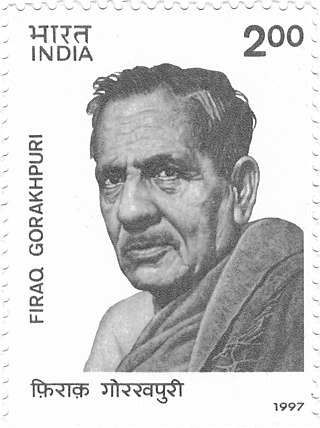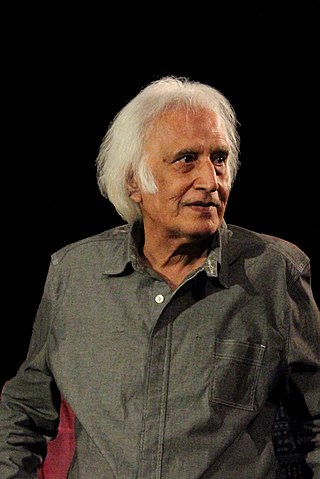Related Research Articles
Indian poetry and Indian literature in general, has a long history dating back to Vedic times. They were written in various Indian languages such as Vedic Sanskrit, Classical Sanskrit, Ancient Meitei, Modern Meitei, Telugu, Tamil, Odia, Maithili, Kannada, Bengali, Assamese, Hindi, Marathi and Urdu among other prominent languages. Poetry in foreign languages such as English also has a strong influence on Indian poetry. The poetry reflects diverse spiritual traditions within India. In particular, many Indian poets have been inspired by mystical experiences. Poetry is the oldest form of literature and has a rich written and oral tradition.

Jan Nisar Akhtar was an Indian poet of Urdu ghazals and nazms, and a part of the Progressive Writers' Movement, who was also a lyricist for Bollywood.

The Sahitya Akademi Award is a literary honour in India, which the Sahitya Akademi, India's National Academy of Letters, annually confers on writers of the most outstanding books of literary merit published in any of the 22 languages of the 8th Schedule to the Indian constitution as well as in English and Rajasthani language.

Raghupati Sahay, also known by his pen name Firaq Gorakhpuri, was an Indian writer, critic, and, according to one commentator, one of the most noted contemporary Urdu poets from India. He established himself among peers including Muhammad Iqbal, Yagana Changezi, Jigar Moradabadi and Josh Malihabadi.

Abdur Rehman Rahi was an Kashmiri poet, translator and critic. He was awarded the Indian Sahitya Akademi Award in 1961 for his poetry collection Nawroz-i-Saba, the Padma Shri in 2000, and India's highest literary award, the Jnanpith Award in 2007. He is the first Kashmiri writer to be awarded the Jnanpith, India's highest literary award for his poetic collection Siyah Rood Jaeren Manz. He was honoured with Sahitya Akademi Fellowship in 2000 by Sahitya Akademi, New Delhi.

Rajinder Singh Bedi was an Indian Urdu writer of the progressive writers' movement and a playwright, who later worked in Hindi cinema as a film director, screenwriter and dialogue writer and he is grandfather to Rajat Bedi and Manek Bedi.
The Sahitya Akademi Fellowship is a literary honour in India bestowed by the Sahitya Akademi, India's National Academy of Letters. It is the highest honour conferred by the Akademi on a living writer, the number of fellows at no time exceeding 21. Elected from among writers thought by the Akademi to be of acknowledged merit, the fellows are sometimes described as the "immortals of Indian literature."

Akhtar ul Iman was a noted Urdu poet and screenwriter in Hindi cinema, who had a major influence on modern Urdu nazm.
Akhlaq Mohammad Khan, better known by his takhallusShahryar, was an Indian academician, and a doyen of Urdu poetry in India. As a Hindi film lyricist, he is best known for his lyrics in Gaman (1978) and Umrao Jaan (1981) directed by Muzaffar Ali. He retired as the head of the Urdu Department at the Aligarh Muslim University, and thereafter he remained sought after name in mushairas or poetic gatherings, and also co-edited the literary magazine Sher-o-Hikmat.

Surendra Verma is a leading Hindi litterateur and playwright. He started out as a playwright, when his play Surya Ki Antim Kiran Se Surya Ki Pahli Kiran Tak became quite well known; it has been translated into six Indian languages. He has had a long association with the National School of Drama.and has published about fifteen titles of short stories, satires, novels and plays.
Rahman Abbas is an Indian fiction writer and the recipient of the India's highest literary Award Sahitya Akademi Award for his fourth novel Rohzin in 2018. He is also the recipient of the two State Academy Awards for his third and fourth novels respectively i.e. Hide and Seek in the Shadow of God (2011) and the Rohzin in 2017. He is the only Indian novelist whose work in German has received a LitProm Grant funded by the German Federal Foreign Office and the Swiss-South Cultural Fund. He writes in Urdu and in English. His novels deal with themes of forbidden politics and love.
Balraj Komal (1928-2013) was an Indian poet and writer of Urdu literature. The Government of India honored Komal in 2011, with the fourth highest civilian award of Padma Shri.
Ale Ahmad Suroor (1911-2002) was an Urdu poet, critic and professor from India. He is best known for his literary criticism. In 1974 he was honoured with the Sahitya Akademi Award by the Government of India for his literary critic work, Nazar aur Nazariya. In 1991 he was also awarded the Padma Bhushan, India's third highest civilian award. He was awarded a special gold medal by the President of Pakistan on the centenary of the birth of Muhammad Iqbal.
Gadul Singh Lama, popularly known as Sanu Lama, is an Indian fiction writer, poet and translator of Nepali literature.He was an engineer by profession, he has published three short story anthologies and his stories have been translated into English, Hindi, Urdu, Assamese and Oriya languages. He is a recipient of Sahitya Akademi Award (1993), apart from other awards such as Sikkim Bhanu Puraskar, Dr. Shova Kanti Thegim Smrithi Puraskar and Madan Byakhanmala Puraskar. The Government of India awarded him the fourth highest civilian honour of the Padma Shri, in 2005, for his contributions to literature.
Khwaja Ghulam Saiyidain (1904–1971) was an Indian educationist, writer and the Secretary at the Ministry of Education of the Government of India, known for his contributions to Indian educational sector. Born in 1904 in the historic city of Panipat, in the Indian state of Haryana, Saiyidain authored several publications on Indian culture and education including a 1960 report which is reported to have served as the blueprint for the establishment of National Service Scheme, a youth-centric social programme sponsored by the Union Government. He wrote in Urdu and English languages and his book, Andhi Mein Chirag, won the Sahitya Akademi Award in 1963. Iqbal's Educational Philosophy, The Crisis in Modern Society, Education, Culture and the Social Order and The School of the Future are some of his other notable works. The Government of India awarded him the third highest civilian honour of the Padma Bhushan, in 1967, for his contributions to Indian education sector.
Nizam Siddiqui is an Indian Allahabad-based author writing in Urdu. He did his schooling from the Anglo Bengali Inter College and graduate and post-graduate work at Kanpur University. In 2013, He has received Sahitya Akademi Translation Prize for translating Manohar Shyam Joshi's Hindi novel Kyap into Urdu. His literary critique Mabad-e-Jadidiat Se Naye Ahed Ki Takhliqiyat Tak won the 2016 Sahitya Akademi Award for Urdu. In addition to this work, he has created seven works of fiction and two books on criticism

The Gujarat Sahitya Akademi or Gujarat Sahitya Academy, established in 1981, is a government institution dedicated to the development of the languages spoken in Gujarat, India and their literature. Gujarati, an official language of Gujarat, is one of them; the others are Hindi, Sanskrit, Kutchi, Sindhi and Urdu. As of 2022, Bhagyesh Jha is the chairman of the Akademi.
References
- ↑ "Sahitya honour for Dogri, Punjabi writers". The Tribune. 19 December 2014. Retrieved 6 May 2023.
- ↑ "Kulkarni for promotion of Urdu to bring India, Pak closer". India Today. 15 March 2016.
- ↑ Devapriya Roy (21 February 2016). "A reader's guide to the 24 books that have won the Sahitya Akademi awards". Scroll.in.